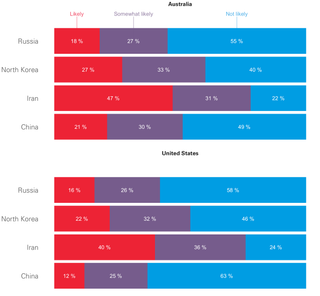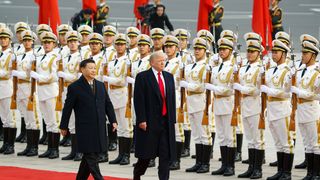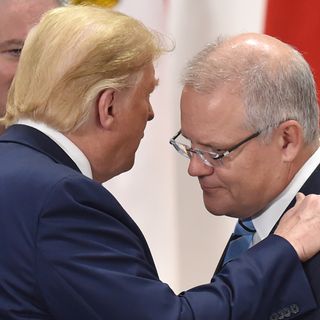While Australians are concerned about the rise of China – and the United States’ ability to handle it – Americans appear to be more complacent, according to a new USSC-YouGov poll.
How well is the United States handling China?
While Americans are evenly divided on how well President Trump is handling US relations with China, nearly two-thirds of Australians disapprove. These attitudes do not seem to be particularly driven by attitudes towards Donald Trump, either. Rather, Australian concerns appear to be driven by the perception that China is becoming more influential.
Growing Chinese power and a new Cold War
A majority of Australians believe China has overtaken the United States as the world’s technological leader, that Australia has become too economically dependent on it, and more than twice as many Australians agree than disagree with the idea that China and the United States are in a new ‘Cold War’. Perhaps as a consequence, most Australians are opposed to any involvement in the Chinese Belt and Road initiative (BRI). Americans are much more sanguine about all of these concerns, with most having no opinion about BRI and nearly half not sure about whether China was strategic competitor for global influence.
The possibility of war
Most Australians and Americans believe peace is the most likely state in foreign affairs for the foreseeable future. When asked their opinion, they say conflict between the United States and China, Iran, North Korea is unlikely in the next decade. There were interesting variations, though. Australians are more likely to believe the United States may engage in a military conflict with China, Iran and North Korea in the next 10 years, and equally convinced there will be conflict between the United States and Russia.
Twenty-seven per cent of Australians said a US-North Korean military conflict was likely, compared with 22 per cent of Americans. Twenty-one per cent of Australian respondents believed a conflict between the United States and China was likely, compared with 12 per cent of Americans.
Almost half (47 per cent) of Australians thought a conflict between the United States and Iran was likely, though, versus 40 per cent of respondents from the United States.
It was only on Russia that opinions in the two countries were almost identical. Eighteen per cent of Australians thought military conflict was likely between the United States and Russia, while the figure for Americans was 16 per cent.
Detailed results
Approval of US efforts to handle China
When assessing Australian and American attitudes to how well the US government (and Trump administration) were handling relations with China, a survey experiment was conducted. The sample was split, with half of respondents in both countries provided a treatment — asked whether they approved of President Trump’s handling of China-US relations — and the other half a control, and simply asked how well they believe the US government was handing relations with China.
These results suggest that Australians are far more concerned about the ability of the United States to effectively manage its relationship with China. Responses in the United States were largely driven by partisanship (Republicans approving Democrats disapproving) while in Australia there is clearly broad-based concern about the US administration’s actions to date.
American respondents were split evenly on President Trump’s management of the relationship between China and the United States. Australians were more pessimistic, with 64 per cent disapproving, a 14 per cent gap between the two countries. The control group provided roughly similar answers. In this half of the sample, approximately 60 per cent of Australians still disapproved, and American attitudes were the same.
Yet when looking at the data by taking into account other information we have on survey respondents, we find a big gap between American voters. Just 12 per cent of Clinton voters approve of President Trump’s actions, whereas 94 per cent of Trump voters approve. Notably, the approval rating for US government handling of US-China relations held by Trump’s base declines by 6 per cent. In Australia, there is some, but less, partisan difference. Approximately half of Coalition voters approved of the way United States is handling relations with China (far less than Republicans but more than Democrats) while nearly a quarter of Labor voters feel the same.
Approval of US efforts to handle China
|
|
Australia (%) |
United States (%) |
Difference (%) |
|
Do you approve or disapprove of the way President Trump is handling relations between the United States and China? |
|||
|
Approve |
36 |
50 |
14 |
|
Disapprove |
64 |
50 |
-14 |
|
Do you approve or disapprove of the way the United States government is handling relations between the United States and China? |
|||
|
Approve |
40 |
51 |
11 |
|
Disapprove |
60 |
49 |
-11 |
By vote in the last election
|
|
2019 past vote (Aus) |
2016 past vote (US) |
||||
|
|
Coalition (%) |
Greens (%) |
Labor (%) |
Donald Trump (%) |
Hillary Clinton (%) |
Independent (%) |
|
Do you approve or disapprove of the way President Trump is handling relations between the United States and China? |
||||||
|
Approve |
48 |
15 |
26 |
94 |
12 |
30 |
|
Disapprove |
52 |
85 |
74 |
6 |
88 |
70 |
|
Do you approve or disapprove of the way the United States government is handling relations between the United States and China? |
||||||
|
Approve |
56 |
23 |
26 |
88 |
22 |
41 |
|
Disapprove |
44 |
77 |
74 |
12 |
78 |
59 |
|
|
|
|
|
|
|
|
The rise of China and a new Cold War
A majority of Australians believe China has overtaken the United States as the world’s technological leader, that Australia has become too economically dependent on it, and nearly twice as many Australians agree than disagree with the idea that China and the United Statesare in a new ‘Cold War’. Thirty-nine per cent of Australian respondents think that China and the United States are in new ‘Cold War’, whereas only 28 per cent of Americans think the same. Fifty-two per cent of Australians, compared to 39 per cent of Americans, think China has over taken the United States as a technological super power. Meanwhile 68 per cent of Australians believe that their country is too economically invested in China, while 51 per cent of Americans think the same.
Americans appear to be less concerned, with nearly half not sure about whether China was strategic competitor for global influence.
Perhaps as a consequence, most Australians are opposed to any involvement in the Chinese Belt and Road initiative (BRI). The BRI is a plan by the Chinese government to develop infrastructure and investments internationally. Australians were asked whether they would want to see Australia participate. Americans were asked whether the United States should actively discourage allies from participating. Fifty-one per cent of Australians believe that Australia should not participate in the initiative, whereas only 25 per cent of Americans think allies should be disuaded from participating.
Do you agree or disagree with the following statements? Please select one option per row.
|
|
Australia (%) |
United States (%) |
Difference (%) |
|
Your country is too economically dependent on China |
|||
|
Strongly agree |
19 |
13 |
-6 |
|
Agree |
44 |
38 |
-6 |
|
Neither agree nor disagree |
27 |
30 |
3 |
|
Disagree |
9 |
15 |
6 |
|
Strongly disagree |
1 |
3 |
2 |
|
China has overtaken the United States as the world’s technological leader |
|||
|
Strongly agree |
14 |
10 |
-4 |
|
Agree |
38 |
29 |
-9 |
|
Neither agree nor disagree |
33 |
34 |
1 |
|
Disagree |
13 |
22 |
9 |
|
Strongly disagree |
3 |
6 |
3 |
|
The United States and China are in a ‘Cold War’ |
|||
|
Strongly agree |
7 |
4 |
-3 |
|
Agree |
32 |
24 |
-8 |
|
Neither agree nor disagree |
44 |
46 |
2 |
|
Disagree |
15 |
21 |
6 |
|
Strongly disagree |
2 |
5 |
3 |
By vote in the last election
|
|
2019 past vote (Aus) |
2016 past vote (US) |
||||
|
|
Coalition (%) |
Greens (%) |
Labor (%) |
Donald Trump (%) |
Hillary Clinton (%) |
Independent (%) |
|
Your country is too economically dependent on China |
||||||
|
Stongly agree |
19 |
16 |
17 |
13 |
17 |
16 |
|
Agree |
46 |
40 |
42 |
41 |
37 |
47 |
|
Neither agree or disagree |
23 |
33 |
31 |
26 |
29 |
19 |
|
Disagree |
10 |
10 |
9 |
15 |
15 |
16 |
|
Strongly disagree |
1 |
2 |
2 |
4 |
3 |
2 |
|
China has overtaken the United States as the world’s technological leader |
||||||
|
Stongly agree |
13 |
17 |
14 |
6 |
14 |
13 |
|
Agree |
36 |
39 |
40 |
22 |
37 |
28 |
|
Neither agree or disagree |
35 |
31 |
30 |
28 |
31 |
32 |
|
Disagree |
14 |
11 |
13 |
34 |
14 |
23 |
|
Strongly disagree |
3 |
2 |
3 |
10 |
4 |
4 |
|
The United States and China are in a ‘Cold War’ |
||||||
|
Stongly agree |
8 |
5 |
8 |
4 |
5 |
7 |
|
Agree |
35 |
22 |
34 |
29 |
25 |
27 |
|
Neither agree or disagree |
42 |
49 |
41 |
42 |
44 |
38 |
|
Disagree |
14 |
23 |
15 |
19 |
21 |
23 |
|
Strongly disagree |
2 |
2 |
2 |
5 |
5 |
5 |
|
|
|
|
|
|
|
|
Should there be more or less economic investment from the following countries in Australia/the United States?
|
|
Australia (%) |
United States (%) |
Difference (%) |
|
China |
|||
|
Much more economic investment |
7 |
9 |
2 |
|
A little more economic investment |
12 |
10 |
-2 |
|
About the same amount of economic investment as now |
32 |
35 |
3 |
|
A little less economic investment |
21 |
23 |
2 |
|
Much less economic investment |
28 |
23 |
-5 |
|
The United States (Australian respondents)/Germany (US respondents) |
|||
|
Much more economic investment |
12 |
13 |
|
|
A little more economic investment |
21 |
20 |
|
|
About the same amount of economic investment as now |
45 |
49 |
|
|
A little less economic investment |
13 |
10 |
|
|
Much less economic investment |
9 |
7 |
|
|
Japan |
|||
|
Much more economic investment |
13 |
14 |
1 |
|
A little more economic investment |
23 |
19 |
-4 |
|
About the same amount of economic investment as now |
42 |
49 |
7 |
|
A little less economic investment |
11 |
10 |
-1 |
|
Much less economic investment |
11 |
8 |
-3 |
By vote in the last election
|
|
2019 past vote (Aus) |
2016 past vote (US) |
||||
|
|
Coalition (%) |
Greens (%) |
Labor (%) |
Donald Trump (%) |
Hillary Clinton (%) |
Independent (%) |
|
China |
||||||
|
Much more economic investment |
8 |
5 |
7 |
10 |
8 |
8 |
|
A little more economic investment |
13 |
10 |
12 |
8 |
13 |
8 |
|
About the same amount of economic investment as now |
30 |
37 |
34 |
27 |
36 |
31 |
|
A little less economic investment |
21 |
24 |
22 |
23 |
23 |
29 |
|
Much less economic investment |
28 |
23 |
25 |
31 |
20 |
24 |
|
The United States/Germany |
||||||
|
Much more economic investment |
14 |
8 |
10 |
13 |
14 |
12 |
|
A little more economic investment |
28 |
15 |
19 |
18 |
24 |
21 |
|
About the same amount of economic investment as now |
43 |
49 |
45 |
46 |
49 |
47 |
|
A little less economic investment |
11 |
19 |
13 |
12 |
7 |
10 |
|
Much less economic investment |
4 |
10 |
12 |
10 |
6 |
10 |
|
Japan |
||||||
|
Much more economic investment |
14 |
10 |
14 |
12 |
14 |
11 |
|
A little more economic investment |
26 |
25 |
21 |
19 |
22 |
19 |
|
About the same amount of economic investment as now |
41 |
47 |
44 |
47 |
47 |
53 |
|
A little less economic investment |
12 |
11 |
10 |
10 |
10 |
9 |
|
Much less economic investment |
8 |
8 |
11 |
11 |
7 |
8 |
|
|
|
|
|
|
|
|
Belt and Road Initiative
US Question: The Belt and Road Initiative is a plan of the Chinese government to develop infrastructure and investments internationally. Some say the Belt and Road Initiative will create economic growth and raise living standards. Others say that the initiative is being used to extend China’s influence in other countries. Should America actively discourage its allies from participating in the initiative with diplomatic and economic pressure, or not interfere and let Chinese governments and companies to build and own infrastructure in other countries?
Australia question: The Belt and Road Initiative is a plan of the Chinese government to develop infrastructure and investments internationally. Some say the Belt and Road Initiative will create economic growth and raise living standards. Others say that the initiative is being used to extend China’s influence in other countries. Do you think Australia should participate in the initiative and allow Chinese governments and companies to build and own infrastructure in Australia?
|
Australia |
% |
|
Australia should not participate in the Belt and Road initiative |
51 |
|
Australia should participate in the Belt and Road initiative |
16 |
|
Not sure |
33 |
|
United States |
|
|
Actively discourage allies from participating in the Belt and Road initiative |
25 |
|
Do not try to stop allies who wish to participate in the Belt and Road initiative |
23 |
|
Not sure |
52 |
|
|
|
By vote in the last election (Australia)
|
Coalition |
% |
|
Australia should not participate in the Belt and Road initiative |
55 |
|
Australia should participate in the Belt and Road initiative |
17 |
|
Not sure |
28 |
|
Greens |
|
|
Australia should not participate in the Belt and Road initiative |
47 |
|
Australia should participate in the Belt and Road initiative |
15 |
|
Not sure |
38 |
|
Labor |
|
|
Australia should not participate in the Belt and Road initiative |
47 |
|
Australia should participate in the Belt and Road initiative |
19 |
|
Not sure |
33 |
|
|
|
By vote in the last election (United States)
|
Donald Trump |
% |
|
Actively discourage allies from participating in the Belt and Road initiative |
38 |
|
Do not try to stop allies who wish to participate in the Belt and Road initiative |
18 |
|
Not sure |
45 |
|
Hillary Clinton |
|
|
Actively discourage allies from participating in the Belt and Road initiative |
20 |
|
Do not try to stop allies who wish to participate in the Belt and Road initiative |
30 |
|
Not sure |
50 |
|
Independent |
|
|
Actively discourage allies from participating in the Belt and Road initiative |
36 |
|
Do not try to stop allies who wish to participate in the Belt and Road initiative |
34 |
|
Not sure |
30 |
|
|
|
Different assessments on the chances of an American military conflict
Australians are far more concerned about the possibility of military conflict between the United States and a number of regional competitors in Asia. Just 37 per cent of Americans said they thought military conflict between the United States and China was likely or somewhat likely to occur in the next decade, while approximately half of Australian respondents believed military conflict was likely or somewhat likely. Sixty-three per cent of American respondents compared felt that conflict was not likely, 14 per cent more than in Australia (49 per cent).
When asked about other nations, including North Korea, Iran and Russia, American and Australian respondents gave similar assessments, with Australians more likely to believe a future conflict involving the United States was likely.
Respondents in both countries were particularly concerned about conflict with Iran. However, again Australian’s were more likely to say war was a concern. Forty-seven per cent of Australians thought a conflict between the United States and Iran was likely, versus 41 per cent of Americans surveyed.
During the next two years, how likely is it that the United States will be in military conflict with...

However when you break down the data by past vote, the greatest difference between partisans in the United States is the likelihood of conflict with Russia, not Iran.
Fifty-one per cent of Clinton voters think that conflict with Russia is somewhat, very or extremely likely in the next 10 years, compared with only 32 per cent of Trump voters (a 19 per cent difference) who think the same thing.
|
|
2019 past vote (Aus) |
2016 past vote (US) |
||||
|
|
Coalition (%) |
Greens (%) |
Labor (%) |
Donald Trump (%) |
Hillary Clinton (%) |
Independent (%) |
|
China |
||||||
|
Extremely likely |
7 |
6 |
6 |
4 |
5 |
2 |
|
Very likely |
13 |
17 |
16 |
6 |
8 |
3 |
|
Somewhat likely |
30 |
28 |
32 |
23 |
26 |
23 |
|
Slightly likely |
24 |
31 |
27 |
33 |
31 |
38 |
|
Not at all likely |
26 |
19 |
19 |
34 |
30 |
33 |
|
Iran |
||||||
|
Extremely likely |
15 |
14 |
18 |
15 |
13 |
10 |
|
Very likely |
31 |
29 |
31 |
26 |
29 |
29 |
|
Somewhat likely |
31 |
36 |
31 |
34 |
35 |
33 |
|
Slightly likely |
17 |
14 |
15 |
20 |
15 |
14 |
|
Not at all likely |
6 |
7 |
5 |
6 |
7 |
14 |
|
North Korea |
||||||
|
Extremely likely |
11 |
9 |
10 |
6 |
11 |
1 |
|
Very likely |
16 |
16 |
18 |
12 |
15 |
12 |
|
Somewhat likely |
30 |
41 |
32 |
22 |
37 |
37 |
|
Slightly likely |
30 |
28 |
26 |
36 |
24 |
26 |
|
Not at all likely |
13 |
6 |
13 |
25 |
13 |
23 |
|
Russia |
||||||
|
Extremely likely |
7 |
3 |
8 |
3 |
8 |
2 |
|
Very likely |
9 |
14 |
13 |
8 |
14 |
14 |
|
Somewhat likely |
30 |
32 |
26 |
21 |
29 |
29 |
|
Slightly likely |
25 |
26 |
28 |
34 |
29 |
29 |
|
Not at all likely |
29 |
25 |
26 |
34 |
20 |
25 |
|
|
|
|
|
|
|
|
About the data
In late July, the United States Studies Centre and YouGov polled 1,800 Americans and 1,820 Australians to learn about the public opinion in both countries on a range of issues, including the role of China in the global economy, how well the US has handled of Chinese-US relations, and whether China has overtaken the United States as a technological leader, and the likelihood of a future conflict between the US, China and other countries.
Surveys were fielded on the YouGov online panel in both countries between 23-29 July 2019. Responses were weighted by YouGov to ensure samples representive of the Australian and American populations. The Australian sample was weighted by age, gender and location. The US sample was weighted by age, gender, race, education, and vote choice at the 2016 presidential election.
A full list of questions used for this report is included at the end of the document.
The margin of error is approximately ± 2.5 percentage points for results reported for the full sample of both the Australian and American surveys. It is larger for sub-groups of the full samples and for differences between the countries.








